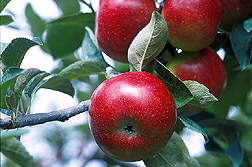This page has been archived and is being provided for reference purposes only. The page is no longer being updated, and therefore, links on the page may be invalid.
|
|
Reflective Particle Films Improve Apple Quality
By Sharon DurhamSeptember 16, 2008
Spraying apple trees with films that contain microscopic mineral particles may improve the color of the fruit and increase its weight.
That's according to Agricultural Research Service (ARS) research leader D. Michael Glenn, who is studying these sprayable films at the ARS Appalachian Fruit Research Station in Kearneysville, W.Va.
Glenn and entomologist Gary Puterka, formerly at Kearneysville and now at the ARS Wheat, Peanut and Other Field Crops Research Laboratory in Stillwater, Okla., conducted a multi-year study in which sprayable particle films were installed strategically in an orchard of Empire apple trees. The particle film's microscopic layer of mineral particles allows water and carbon dioxide to pass through the film.
With some trees, an aluminized plastic film (ALF) was applied to the grass strip between the apple rows. With other trees, a sprayable particle-based reflective film (PF) was applied to the trees as well as the grass between the tree rows. A third group of trees received no treatment.
The ALF consistently improved apple color, while the PF increased red color in apples in two of the three years of the study. When PF was applied to the grass between tree rows, the average fruit weight was increased in all years of the study, compared to the untreated trees and those that received the ALF treatment.
The mechanism responsible for the increased fruit weight with the PF may be the altered light quality that is reflected onto the fruit. This reflected light has enhanced far-red radiation that may have beneficial effects on both fruit color and fruit weight. The particle film also reduced heat and water stress in plants and improves production efficiency.
Based on these findings, new management techniques can be developed that will improve apple quality in a cost-effective manner.
ARS is a scientific research agency of the U.S. Department of Agriculture.

